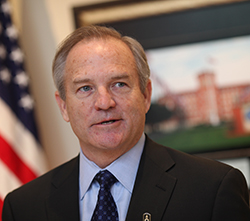WACO—Cynicism damages public discourse and threatens the political process, but hope offers greater power, former Congressman Chet Edwards told the Civic Life Summit at Baylor University.
“Cynicism is a powerful and a destructive force,” said Edwards, a Democrat who represented a predominantly Republican Central Texas district in the U.S. Congress 20 years. “It can suck the energy out of an individual, a community and—yes, even now—the country.
 “If unchecked, cynicism can spread like a virus, killing all that is good in its path—faith, hope and love. It can rob us of the belief that one can make a difference and that ‘we the people’ can make a difference in our democracy. And like the massive black holes of outer space, cynicism if gone to its extreme can literally turn light into darkness.”
“If unchecked, cynicism can spread like a virus, killing all that is good in its path—faith, hope and love. It can rob us of the belief that one can make a difference and that ‘we the people’ can make a difference in our democracy. And like the massive black holes of outer space, cynicism if gone to its extreme can literally turn light into darkness.”
The loss of hope in upward mobility, the loss of faith in fundamental institutions and the loss of trust in elected officials all represent evidence of cynicism, Edwards told the summit, convened by Baylor’s Public Deliberation Initiative.
Yielding to the ‘siren song of cynicism”
“In the face of the political and social challenges we face in our country today, cynicism can be a temptation for all of us, regardless of our political or social views,” he said. “It is the path of least resistance. It is the easy course to take—an excuse for giving up, for not voting, for not trying to make a difference anymore.”
Edwards, who holds the W.R. Poage Distinguished Chair in Public Service at Baylor, acknowledged he easily could have surrendered to the “siren song of cynicism” in 2008 when, after he endorsed Barack Obama’s bid for the presidency, his district office was “deluged by racist, bitter, bigoted calls.”
Likewise, Edwards called the 2016 presidential election “a body blow to my hope for the future of our country,” citing a list of well-publicized remarks by then-candidate Donald Trump that initially made his election seem unthinkable.
“While I detest the politics of fear and division, I have come to accept that is it wrong to assume that most people who voted for Mr. Trump did so out of racial bigotry,” he said. “I have more faith in the American people than that.
“While, sadly, there are still too many whose votes, politics and views are influenced by bigotry and race, I believe most voters voted for Mr. Trump for one simple reason: They believed our political system is broken, which it is, and they wanted to try to change it, to see if they could make it better.”
Although he described recent presidential campaigns as “blood sport,” Edwards cited quotations from the 1800 presidential race between John Adams and Thomas Jefferson to illustrate vitriolic political rhetoric is nothing new.
‘Never give up our hope for a better future’
In spite of cynics who have predicted catastrophe in the United States if their candidate did not prevail in an election, the republic has endured and thrived, he noted.
“We are a people who never give up our hope for a better future,” Edwards said.
In every generation, some people strive to reach the highest ideals expressed in the Declaration of Independence and the Bill of Rights to the U.S. Constitution, he said. The nation’s hope rests in people who recognize the country’s imperfections but work to make it “a more perfect union,” he insisted.
Edwards challenged summit participants to follow the admonition of Martin Luther King Jr., who said, “We must accept finite disappointments but never lose infinite hope.”
Make a difference
In 28 years of public service—first in the Texas Senate and then in the U.S. House of Representatives, Edwards said, he saw examples of goodness and courage as ordinary people worked to make others’ lives better.
“We are blessed to live in a country where one person can make a difference,” he said.
The belief that each individual finds meaning and purpose in helping improve the lives of others is “for many of us, part of our faith (and) for all of us, part of our DNA,” he insisted.
“In my faith, the calling to ‘love thy neighbor’ is not a calling to have good feelings about one’s neighbor. It’s a call to action,” said Edwards, a longtime Methodist who regularly attends Calvary Baptist Church in Waco and McLean Baptist Church in McLean, Va.
He pointed to the example of John Lewis, the Civil Rights leader who has served in the U.S. Congress since 1987, and read a passage from Lewis’ memoir, Walking with the Wind.
Lewis described a childhood experience when he and 14 other young relatives sought shelter in an aunt’s house during a violent storm. When winds threatened to lift the house off its piers, his aunt told the children to clasp hands and walk to the corner that needed reinforcement to weigh it down.
In his book, Lewis compared that incident to times in U.S. history when storms rocked the country but “people of conscience never left the house.” Instead, he said, they clasped hands and moved toward the weakest corner of the house.
Edwards challenged the Civic Life Summit participants to accept Lewis’ invitation to embrace hope and “make our community a more beloved community and our nation a more perfect union.”















We seek to connect God’s story and God’s people around the world. To learn more about God’s story, click here.
Send comments and feedback to Eric Black, our editor. For comments to be published, please specify “letter to the editor.” Maximum length for publication is 300 words.